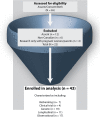Emerging issues in paediatric health research consent forms in Canada: working towards best practices
- PMID: 23363554
- PMCID: PMC3571865
- DOI: 10.1186/1472-6939-14-5
Emerging issues in paediatric health research consent forms in Canada: working towards best practices
Abstract
Background: Obtaining a research participant's voluntary and informed consent is the bedrock of sound ethics practice. Greater inclusion of children in research has led to questions about how paediatric consent operates in practice to accord with current and emerging legal and socio-ethical issues, norms, and requirements.
Methods: Employing a qualitative thematic content analysis, we examined paediatric consent forms from major academic centres and public organisations across Canada dated from 2008-2011, which were purposively selected to reflect different types of research ethics boards, participants, and studies. The studies included biobanking, longitudinal studies, and gene-environment studies. Our purpose was to explore the following six emerging issues: (1) whether the scope of parental consent allows for a child's assent, dissent, or future consent; (2) whether the concepts of risk and benefit incorporate the child's psychological and social perspective; (3) whether a child's ability to withdraw is respected and to what extent withdrawal is permitted; (4) whether the return of research results includes individual results and/or incidental findings and the processes involved therein; (5) whether privacy and confidentiality concerns adequately address the child's perspective and whether standard data and/or sample identifiability nomenclature is used; and (6) whether retention of and access to paediatric biological samples and associated medical data are addressed.
Results: The review suggests gaps and variability in the consent forms with respect to addressing each of the six issues. Many forms did not discuss the possibility of returning research results, be they individual or general/aggregate results. Forms were also divided in terms of the scope of parental consent (specific versus broad), and none discussed a process for resolving disputes that can arise when either the parents or the child wishes to withdraw from the study.
Conclusions: The analysis provides valuable insight and evidence into how consent forms address current ethical issues. While we do not thoroughly explore the contexts and reasons behind consent form gaps and variability, we do advocate and formulate the development of best practices for drafting paediatric health research consent forms. This can greatly ameliorate current gaps and facilitate harmonised and yet contextualised approaches to paediatric health research ethics.
Figures
References
Publication types
MeSH terms
Grants and funding
LinkOut - more resources
Full Text Sources
Other Literature Sources
Molecular Biology Databases



